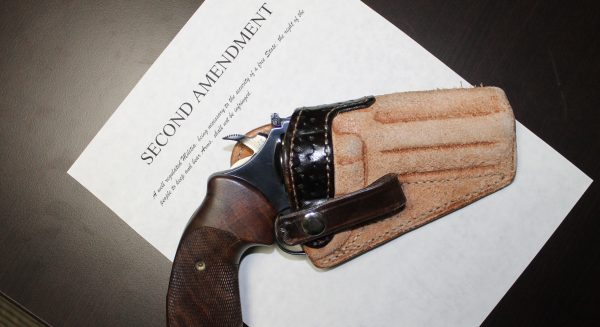
The Hill is reporting that “gun legislation remains a key issue for many voters going into the midterm election this year,” while explaining how gun-related issues are not on the ballot in most states.
But is that accurate? Considering the sometimes vast differences between the political parties on how they address violent crime, Second Amendment rights and restrictions, one might suggest gun rights are on the ballots of all 50 states.
According to The Hill, “An August poll by nonpartisan Pew Research Center found gun policy was the second-most important issue for voters polled going into the midterms. About 62% of registered voters said gun policy came behind economic policy (77%) for November.”
The Pew survey said roughly six in ten voters said gun policy is a top issue that will guide their votes next week. The highest priority sty the time was economic policy.
Jump ahead to this week, and Rasmussen Reports, which says 26 percent of likely voters “say inflation is the most important issue in how they vote in this year’s congressional elections, while another 22% name the economy as the top issue.” Considering how inflation and the economy are essentially locked together, that’s nearly half of all voters who will be guided by their wallets, and that would have to include gun owners.
Democrats have become, according to many in the firearms community, the “party of gun prohibition.” Where they were known previously as the “party of gun control,” that image changed when Democrats began leading the charge to ban so-called “assault weapons.” When Joe Biden revealed last year he also wants to ban 9mm pistols, at least two organizations—the Citizens Committee for the Right to Keep and Bear Arms and the Second Amendment Foundation—quickly launched national advertising campaigns to remind the country of the president’s true intentions.
Gun rights are clearly on two state ballots, in Oregon and Iowa. Oregon’s Ballot Measure 114 would require permits to purchase firearms, along with a training mandate Beaver State law enforcement agencies say they are unprepared to accommodate.
In Iowa, voters will consider a state constitutional right-to-keep-and-bear-arms amendment. The Des Moines Register says recent polling suggests 58 percent of voters will approve the measure, while the newspaper’s editorial page this week offers five arguments against its adoption. One of the arguments is that the country is “in bad enough shape” following the Supreme Court’s June ruling in the Bruen case, which upheld the right to bear arms outside of one’s home. Newspaper editorial boards are traditionally anti-gun-rights, and in this case the board appears woefully out-of-touch with Iowa voters.
Typically, gun control legislation comes from Democrats, whether at the local, state or national level. Opposition to restrictive gun measures typically comes from Republicans. Considering that 25 states have now adopted so-called “constitutional carry,” which translates to permitless carry, expanding that movement will require more state legislatures with pro-gun GOP majorities and governors willing to sign such bills if they pass.
There are now three Supreme Court rulings affirming the right to keep and bear arms. In states where the most recent high court ruling has torpedoed long-standing restrictions on concealed carry applicants, Democrat lawmakers have been scrambling to dance around language in the Bruen decision.
In 2023, state legislatures controlled by Democrats are almost certain to push more restrictions while those under GOP control may refocus their energies on dealing with violent crime by penalizing criminals, not law-abiding gun owners.
It will all be on the line next Tuesday.